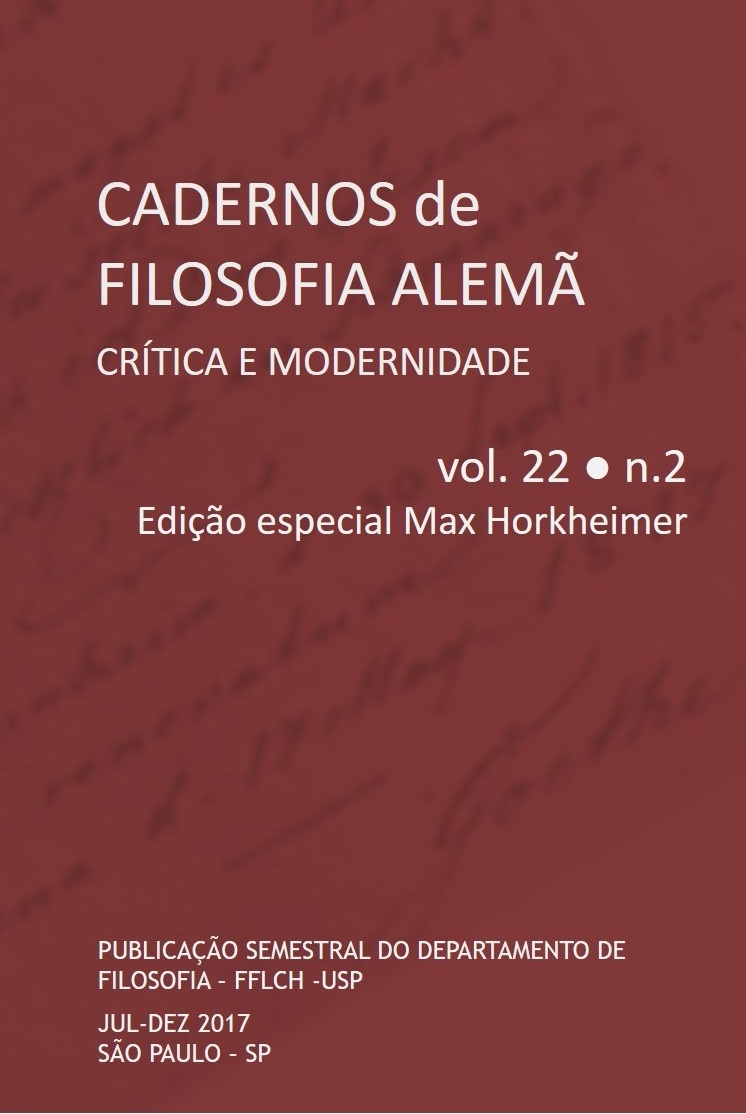Genealogia e historicismo crítico: dois modelos de Esclarecimento nos escritos de Horkheimer e Adorno
DOI:
https://doi.org/10.11606/issn.2318-9800.v22i2p13-38Palavras-chave:
Esclarecimento, historicismo, Max Horkheimer, Theodor Adorno, Escola de FrankfurtResumo
Este artigo sustenta que dois conceitos distintos de Esclarecimento coexistem em tensão na Dialética do esclarecimento de Horkheimer e Adorno. De acordo com o primeiro conceito, genealógico, o Esclarecimento é uma forma confusa de autopreservação que existiu desde a aurora da civilização ocidental. O segundo conceito, historicista crítico, concebe como Esclarecimento os ideais críticos e antiautoritários articulados – mais radicalmente na França do século XVIII – durante o irregular desenvolvimento da sociedade burguesa moderna. Depois de examinar as origens destes dois conceitos nos primeiros escritos de Adorno e Horkheimer, este artigo demonstra porque o primeiro conceito se tornou dominante na Dialética do esclarecimento, ao mesmo tempo apontando traços significativos do segundo conceito que ali permaneceram. Argumenta-se que uma reconsideração do conceito historicista crítico revela um modelo de Teoria Crítica inicial que ainda pode fornecer uma alternativa convincente não apenas para a Dialética do esclarecimento, mas também para as tentativas mais recentes de situar a Teoria Crítica em fundamentos normativos.Downloads
Referências
Abromeit, J. (2006). “The Vicissitudes of the Politics of ‘Life’: Herbert Marcuse and Max Horkheimer’s Reception of Phenomenology and Vitalism in Weimar Germany”. University of Indiana Scholar Works. Disponível online: https://scholarworks.iu.edu/dspace/handle/2022/440 (acessado em 16.01.2017).
___________. (2011). Max Horkheimer and the foundations of the Frankfurt School. New York: Cambridge University Press.
___________. (2013). “Max Horkheimer et le concept matérialiste de la culture”. In: Les normes et le possible: Héritage et perspectives de l’École de Francfort. G. Raulet, P. F. Noppen, and I. Macdonald (eds.). Paris: Maison des sciences de l’homme, pp.53–70.
___________. (2015). “Transformations of Populism in Western Europe”. In: Transformations of Populism in Europe and the Americas: History and Recent Tendencies, Abromeit et al (eds.). London: Bloomsbury.
Adorno, T. W. (1998). “Scientific Experiences of a European Scholar in America”. In: Critical Models: Interventions and Catchwords. Translated by Henry Pickford. New York: Columbia University Press.
Arendt, H. (1968). The Origins of Totalitarianism. New York: Harcourt.
Bates, D. W. (2002). Enlightenment Aberrations: Error and Revolution in France. Ithaca, NY: Cornell University Press.
Benhabib, S.; Bonss, W.; McCole, J. (org). (1993). On Max Horkheimer. New Perspectives. Cambridge, Massachusetts, London: The MIT Press.
Buck-Morss, S. (1977). The Origin of Negative Dialectics: Theodor W. Adorno, Walter Benjamin, and the Frankfurt Institute. New York: Free Press.
Calhoun, C. (ed.). (1992). Habermas and the Public Sphere. Cambridge, MA: MIT Press.
Claussen, D. (1987). Grenzen der Aufklärung: Die gesellschaftliche Genese des modernen Antisemitismus. Frankfurt: Fischer.
Elias, N. (1982). The Civilizing Process. Translated by Edmund Jephcott. Malden, MA: Blackwell.
Gay, P. (1966). The Enlightenment: An Interpretation, vol. 1, The Rise of Modern Paganism. New York: Norton.
___________. (1969). The Enlightenment: An Interpretation, vol. 2, The Science of Freedom. New York: Norton.
Habermas, J. (1989). The Structural Transformation of the Public Sphere: An Inquiry into a Category of Bourgeois Society. Translated by T. Burger. Cambridge, MA: MIT Press [tradução brasileira de Denilson Luís Werle. São Paulo: Vozes, 2014].
Horkheimer, M. (1987). Gesammelte Schriften, vols. 9–10. Alfred Schmidt and Gunzelin Schmid Noerr (eds.). Frankfurt: Fischer.
Horkheimer, M. and Adorno, T. W. (2002). Dialectic of Enlightenment: Philosophical Fragments. Edited by. Gunzelin Schmid Noerr and translated by Edmund Jephcott. Stanford, CA: Stanford University Press [Tradução brasileira: Dialética do Esclarecimento fragmentos filosóficos. Tradução de Guido Antonio de Almeida. Rio de Janeiro: Jorge Zahar, 2006].
___________. (1956). “Ideologie”. In: Frankfurter Beiträge zur Soziologie, vol. 4, Soziologische Exkurse. Theodor W. Adorno and Walter Dirks (eds.). Frankfurt: Europaïsche Verlagsanstalt.
Jenemann, D. (2007). Adorno in America. Minneapolis: University of Minnesota Press.
Kant, I. (1991). “An Answer to the Question: What Is Enlightenment?”. Translated by H. B. Nisbet. In: Political Writings. Hans Reiss (ed.). Cambridge: Cambridge University Press.
Kavanagh, T. (2010). Enlightened Pleasures: Eighteenth-Century France and the New Epicureanism. New Haven, CT: Yale University Press.
La Mettrie. (1775). “Discours sur le Bonheur”. Oeuvres Philosophiques. Berlin.
Marcuse, H. (1955). Eros and Civilization: A Philosophical Inquiry into Freud. Boston: Beacon.
Marx, K. (1967). Capital. New York: International Publishers.
___________. (1978). “Introduction to The Grundrisse”. In: Robert C. Tucker (ed.). The Marx-Engels Reader. 2nd ed. New York: Norton.
___________. (1978a). “The German ideology”. In: Robert C. Tucker (ed.). The Marx-Engels Reader. 2nd ed. New York: Norton.
McCormick, J. P. (2007). Weber, Habermas, and Transformations of the European State: Constitutional, Social, and Supranational Democracy. Cambridge: Cambridge University Press.
Montesquieu (1964). The Persian Letters. Translated by George R. Healy. Indianapolis: Bobbs-Merrill.
Nietzsche, F. (1969). On the Genealogy of Morals and Ecce Homo. Translated by W. Kaufmann and J. Hollingdale. New York: Vintage.
Noerr, G. S. (2002). “Editor’s Afterword”. In: Horkheimer, M. and Adorno, T. W. Dialectic of Enlightenment: Philosophical Fragments. Edited by. Gunzelin Schmid Noerr and translated by Edmund Jephcott. Stanford, CA: Stanford University Press.
Postone, m. (1993). Time, Labor, and Social Domination: A Reinterpretation of Marx’s Critical Theory. Cambridge: Cambridge University Press.
Schorske, C. and Bender, T. (eds.). (1997). American Academic Culture in Transformation: Fifty Years, Four Disciplines. Princeton, NJ: Prince- ton University Press.
Schuster, M. (2014). Adorno, German Idealism, and Modernity. Chicago: University of Chicago Press.
Sewell, W. (2005). Logics of History: Social Theory and Social Transformation. Chicago: University of Chicago Press.
Wheatland, T. (2009). The Frankfurt School in Exile. Minneapolis: University of Minnesota Press.
Wolin, R. (1994). Walter Benjamin: An Aesthetic of Redemption. Berkeley: University of California Press.
Downloads
Publicado
Edição
Seção
Licença
As informações e conceitos emitidos em textos são de absoluta responsabilidade de seus autores.
Todos os artigos anteriores a 5 de julho de 2018 e posteriores a julho de 2021 estão licenciados sob uma licença CC BY-NC-ND, exceto os publicados entre as datas mencionadas, que estão sob a licença CC BY-NC-SA. A permissão para tradução por terceiros do material publicado sob a licença CC BY-NC-ND poderá ser obtida com o consentimento do autor ou autora.
Políticas de acesso aberto - Diadorim



